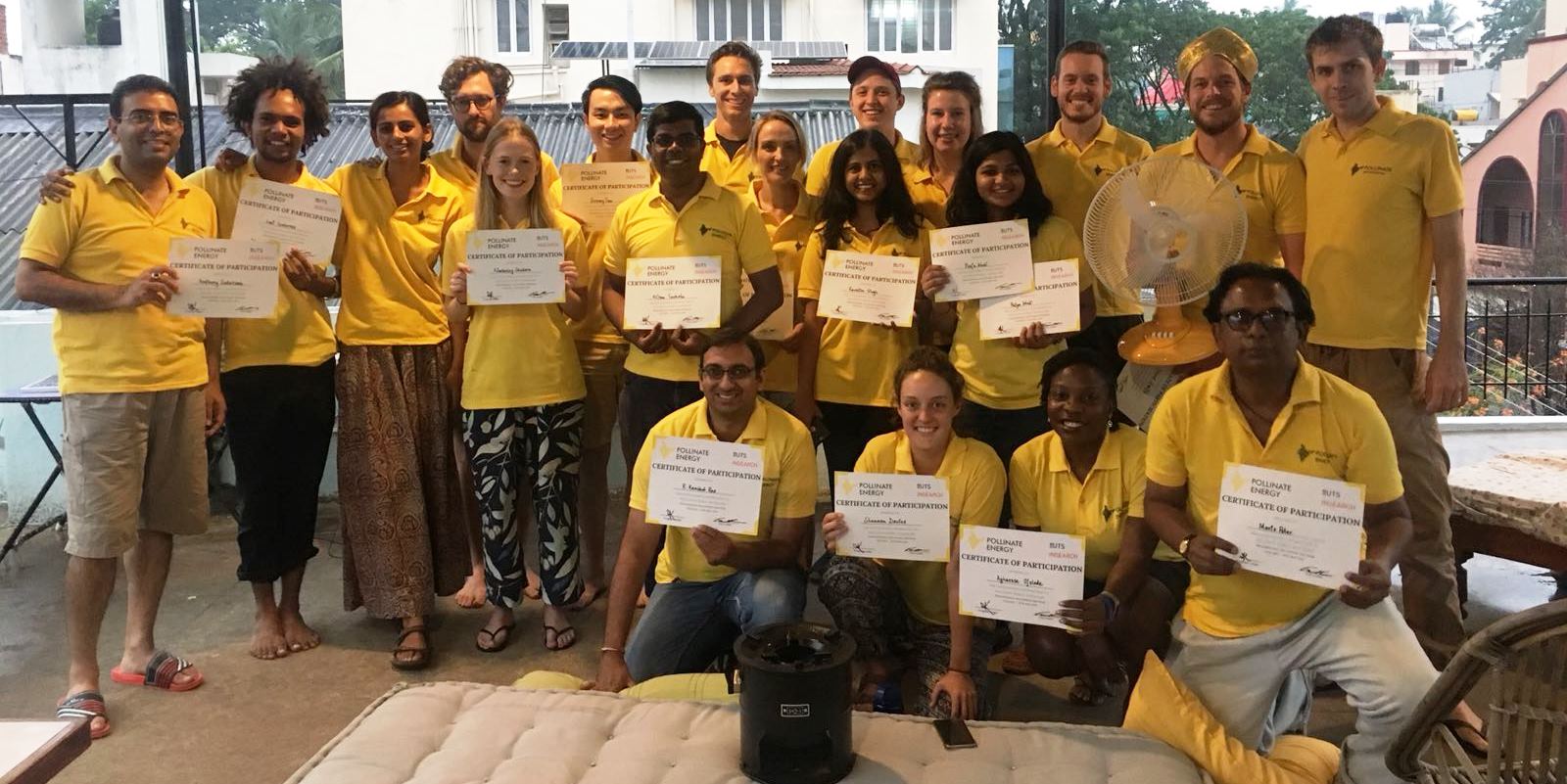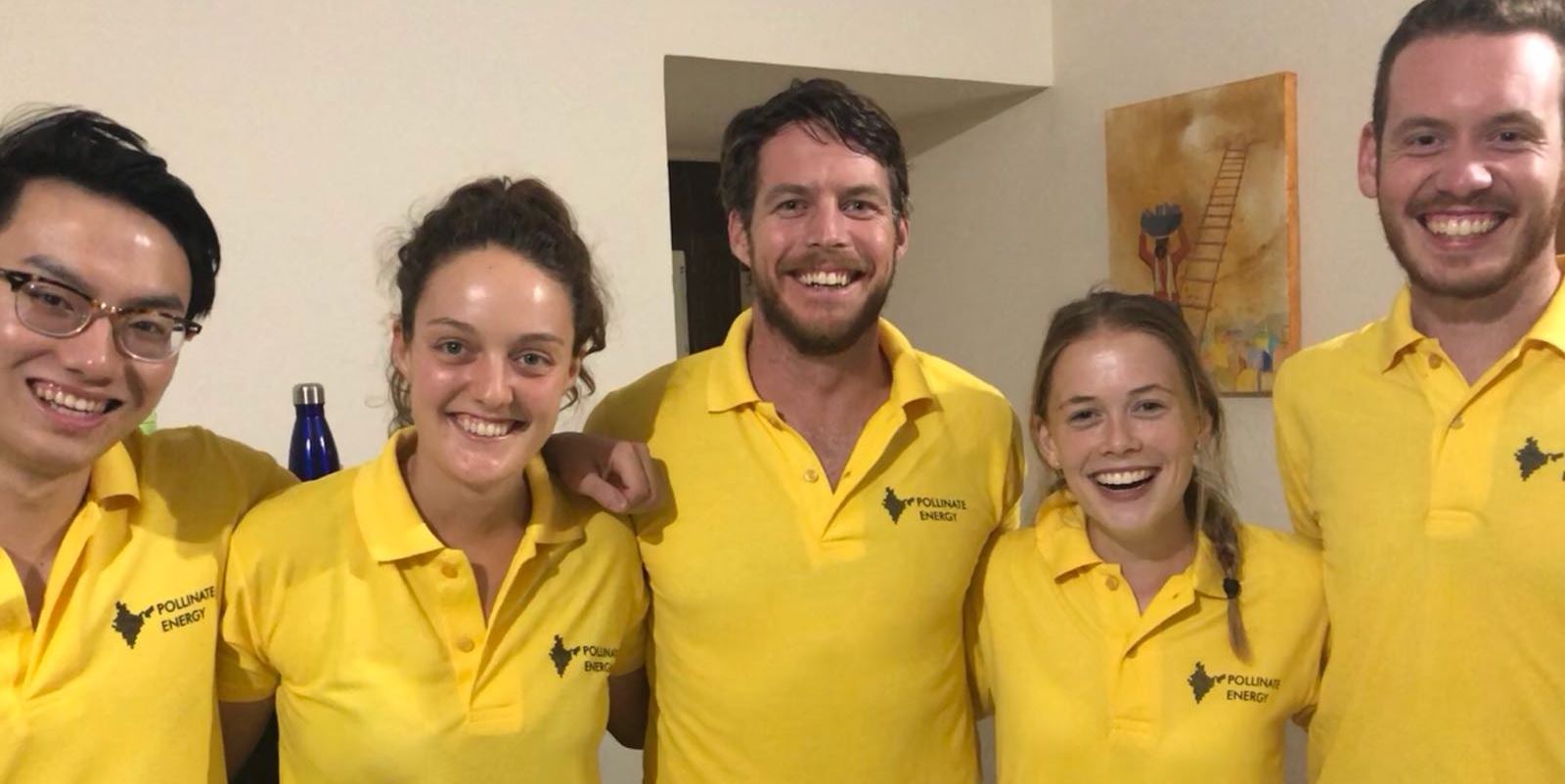Bringing it home
Our amazing time in Bangalore, India, working with Pollinate Energy has come to an end. Our last days with the Professionals Fellowship Program were filled with preparing final presentations and reports, enjoyable nights out together and emotional goodbyes to new friends as we headed to our respective homes across the globe. The findings and recommendations we made in our reports will help Pollinate Energy evaluate the effectiveness of their products and help improve their product range moving forward.
After having a few days to reflect on the program, I decided to catch up with the AECOM team and ask each person a question about their experience.
It is said that “India is a land of contrast.” Did this statement resonate with you?
Grant Smith (Perth): Absolutely, I will forever remember the stark contrast of the wooden dwellings covered in a characteristic blue tarpaulin against a neutral concrete high rise backdrop. We often found that some of the residents of the slum communities had been the construction workers on these exact apartment developments. The irony was not lost on them, either.
However, this glaring disparity is just as memorable as the striking visual impact of seeing a community of more than 200 tents using Pollinate Energy products, signified by a small solar panel placed above the doorway of the home. The panels were akin to a badge of honour for the Pollinators, who strive to reach as many members of the community as possible, positively impacting lives.

The Fellowship spans a short time, a mere 12 days — what were you able to achieve during this time?
Jeremy Tan (Auckland): While our experiences in India with Pollinate Energy lasted only 12 days, each day was packed full with community visits, meetings and adventure. I recall days where we would work from morning to night, even on our only Sunday! However, this was definitely not mundane or arduous in any way, as the people I was surrounded with were supportive, encouraging and fun.
In addition to the friendships made, we were each able to take personalised learnings from our own unique experiences. Mine was centred on my interactions with the people — be they from the temporary slum communities, Pollinate Energy or even the locals we met on the street. Through these interactions, I learned a lot about Indian culture, the sense of community people share in general, the role of social businesses, and even the importance of cricket.

Pollinate energy is a social enterprise. Do you feel you are returning home with a deeper understanding of what this means?
Kimberly Skellern (Sydney): I’m definitely taking home a deeper understanding of how a social enterprise works. Like a non-profit, Pollinate Energy is driven by a social, environmental or cultural cause, but like a private business, it derives most of its income from trade (not donations or grants). Uniquely, Pollinate uses most of its profits to work toward its social mission and increase its scope/magnitude of impact.
Over the past two weeks, we also experienced first-hand some of the challenges faced by a social enterprise, such as being heavily reliant upon (but also constrained by) their finite human resources.
Something else I’ve found is a renewed understanding of how to approach the problem of poverty. I admire the way Pollinate sees its customers and works with them. Instead of giving one-off handouts or assuming what people need, Pollinate works to understand and empower people. And the products help others thrive. For example, solar lights enable young people in the community to study at night. A smart phone can help a resident access job opportunities. I find the approach very inspiring.
Is it true what people say, that India is an “assault on the senses”?
Shannon Davies (Newcastle): So many senses are overwhelmed in India. In the cities, there is the sound of ever persistent honking. Your nose takes in both the whiff of cow dung and aromas of spices and incense all at the same time. Eating with your hands allows for a secondary sensation to the experience of taste. And finally, the scorching heat serves to make each moment more intense!
I thoroughly enjoyed the colours of India — women in the street wearing their saris, passing colourful temples and people selling fresh flowers. I struggled with the inequality that still exists between castes and the poverty that is so widespread, but India is also a living example of how people of different religions can live together in relative harmony.
Above all, I fell in love with the food. More than just being delicious, it was immediately obvious that food in India is the glue that connects people. It is one of two common loves that unite the nation. Food…and cricket!
*****
Working with Pollinate Energy has been an amazing experience for our AECOM team. Each of us has reflected that, while we set out to Bangalore hoping we could make an impact for others, our individual and collective experiences have also made a lasting impact on each of us.

We’re thankful for Pollinate Energy, not just for the way we were welcomed in India, but for the continued amazing work it does. We’re also thankful to AECOM for providing this wonderful opportunity to give back. If you missed previous posts from my colleagues, scroll through the AECOM Blog. And to learn more about our Corporate Responsibility platform, Blueprint for a Better World, visit: https://aecom.com/about-aecom/corporate-responsibility/






